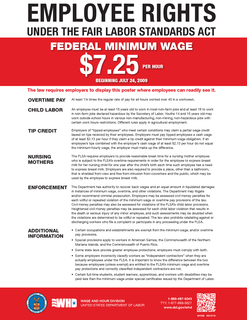Labour law is the area of law most commonly relating to the relationship between trade unions, employers and the government.

Workers' compensation is a form of insurance providing wage replacement and medical benefits to employees injured in the course of employment in exchange for mandatory relinquishment of the employee's right to sue their employer for the tort of negligence. The trade-off between assured, limited coverage and lack of recourse outside the worker compensation system is known as "the compensation bargain". One of the problems that the compensation bargain solved is the problem of employers becoming insolvent as a result of high damage awards. The system of collective liability was created to prevent that, and thus to ensure security of compensation to the workers. Individual immunity is the necessary corollary to collective liability.
Employment is a relationship between two parties, usually based on a contract where work is paid for, where one party, which may be a corporation, for profit, not-for-profit organization, co-operative or other entity is the employer and the other is the employee. Employees work in return for payment, which may be in the form of an hourly wage, by piecework or an annual salary, depending on the type of work an employee does or which sector she or he is working in. Employees in some fields or sectors may receive gratuities, bonus payment or stock options. In some types of employment, employees may receive benefits in addition to payment. Benefits can include health insurance, housing, disability insurance or use of a gym. Employment is typically governed by employment laws, regulations or legal contracts.

A wage is monetary compensation paid by an employer to an employee in exchange for work done. Payment may be calculated as a fixed amount for each task completed, or at an hourly or daily rate, or based on an easily measured quantity of work done.

A salary is a form of payment from an employer to an employee, which may be specified in an employment contract. It is contrasted with piece wages, where each job, hour or other unit is paid separately, rather than on a periodic basis. From the point of view of running a business, salary can also be viewed as the cost of acquiring and retaining human resources for running operations, and is then termed personnel expense or salary expense. In accounting, salaries are recorded in payroll accounts.

A domestic worker, domestic helper, domestic servant, manservant or menial, is a person who works within the employer's household. Domestic helpers perform a variety of household services for an individual or a family, from providing care for children and elderly dependents to housekeeping, including cleaning and household maintenance. Other responsibilities may include cooking, laundry and ironing, shopping for food and other household errands. Such work has always needed to be done but before the Industrial Revolution and the advent of labour saving devices, it was physically much harder.
The Statute of Labourers was a law created by the English parliament under King Edward III in 1351 in response to a labour shortage, designed to suppress the labour force by prohibiting increases in wages and prohibiting the movement of workers from their home areas in search of improved conditions. It was poorly enforced and did not stop the rise in wages.

The National Minimum Wage Act 1998 creates a minimum wage across the United Kingdom, which from 1 April 2018 was £7.83 per hour for workers aged over 25, £7.38 per hour for workers aged 21 to 24, and £5.90 per hour for workers aged 18 to 20.
The Matignon Agreements were signed on 7 June 1936, between the Confédération générale de la production française (CGPF) employers' organization, the CGT trade union and the French state. They were signed during a massively followed general strike initiated after the election of the Popular Front in May 1936, which had led to the creation of a left-wing government headed by Léon Blum (SFIO). Also known as the "Magna Carta of French Labor", these agreements were signed at the Hôtel Matignon, official residence of the head of the government, hence their name.
Master and Servant Acts or Masters and Servants Acts were laws designed to regulate relations between employers and employees during the 18th and 19th centuries. An 1823 United Kingdom Act described its purpose as "the better regulations of servants, labourers and work people". This particular Act greatly influenced industrial relations and employment law in the United States, Australia, Canada (1847), New Zealand (1856) and South Africa (1856). These Acts are generally regarded as heavily biased towards employers, designed to discipline employees and repress the "combination" of workers in trade unions.
The Ordinance of Labourers 1349 is often considered to be the start of English labour law. Specifically, it fixed wages and imposed price controls; required all those under the age of 60 to work; prohibited the enticing away of another's servants; and other terms.
Truck Acts is the name given to legislation that outlaws truck systems, which are also known as "company store" systems, commonly leading to debt bondage. In England and Wales such laws date back to the 15th century. They have also been implemented in other countries.

The minimum wage in the United States is set by US labor law and a range of state and local laws. Employers generally have to pay workers the highest minimum wage prescribed by federal, state, and local law. Since July 24, 2009, the federal government has mandated a nationwide minimum wage of $7.25 per hour. As of January 2018, there were 29 states with a minimum wage higher than the federal minimum. From 2017 to 2018, eight states increased their minimum wage levels through automatic adjustments, while increases in eleven other states occurred through referendum or legislative action.
The Statute of Artificers 1563 was an Act of Parliament of England, under Queen Elizabeth I, which sought to fix prices, impose maximum wages, restrict workers' freedom of movement and regulate training. The causes of the measures were short-term labor shortages due to mortality from epidemic disease, as well as, inflation, poverty, and general social disorder. Local magistrates had responsibility for regulating wages in agriculture. Guilds regulated wages of the urban trades. Effectively, it transferred to the newly forming English state the functions previously held by the feudal craft guilds. The measure sought to make agriculture a trade and a national priority of employment.

The Fair Labor Standards Act of 1938 29 U.S.C. § 203 (FLSA) is a United States labor law that creates the right to a minimum wage, and "time-and-a-half" overtime pay when people work over forty hours a week. It also prohibits most employment of minors in "oppressive child labor". It applies to employees engaged in interstate commerce or employed by an enterprise engaged in commerce or in the production of goods for commerce, unless the employer can claim an exemption from coverage.
Indian labour law refers to laws regulating labour in India. Traditionally, Indian governments at federal and state level have sought to ensure a high degree of protection for workers, but in practice, this differs due to form of government and because labour is a subject in the concurrent list of the Indian Constitution.

Lee v Lee’s Air Farming Ltd [1960] UKPC 33 is a company law case from New Zealand, also important for UK company law and Indian Companies Act 2013, concerning the corporate veil and separate legal personality. The Judicial Committee of the Privy Council reasserted that a company is a separate legal entity, so that a director could still be under a contract of employment with the company he solely owned.

The Minimum Wages Act 1948 is an Act of Parliament concerning Indian labour law that sets the minimum wages that must be paid to skilled and unskilled labours.
The Inter-State Migrant Workmen Act, 1979 is an Act of the Parliament of India enacted to regulate the condition of service of inter-state labourers in Indian labour law. The Act's purpose is to protect workers whose services are requisitioned outside their native states in India. Whenever an employer faces shortage of skills among the locally available workers, the act creates provision to employ better skilled workers available outside the state.
In law, wrongful dismissal, also called wrongful termination or wrongful discharge, is a situation in which an employee's contract of employment has been terminated by the employer, where the termination breaches one or more terms of the contract of employment, or a statute provision or rule in employment law. Laws governing wrongful dismissal vary according to the terms of the employment contract, as well as under the laws and public policies of the jurisdiction.









